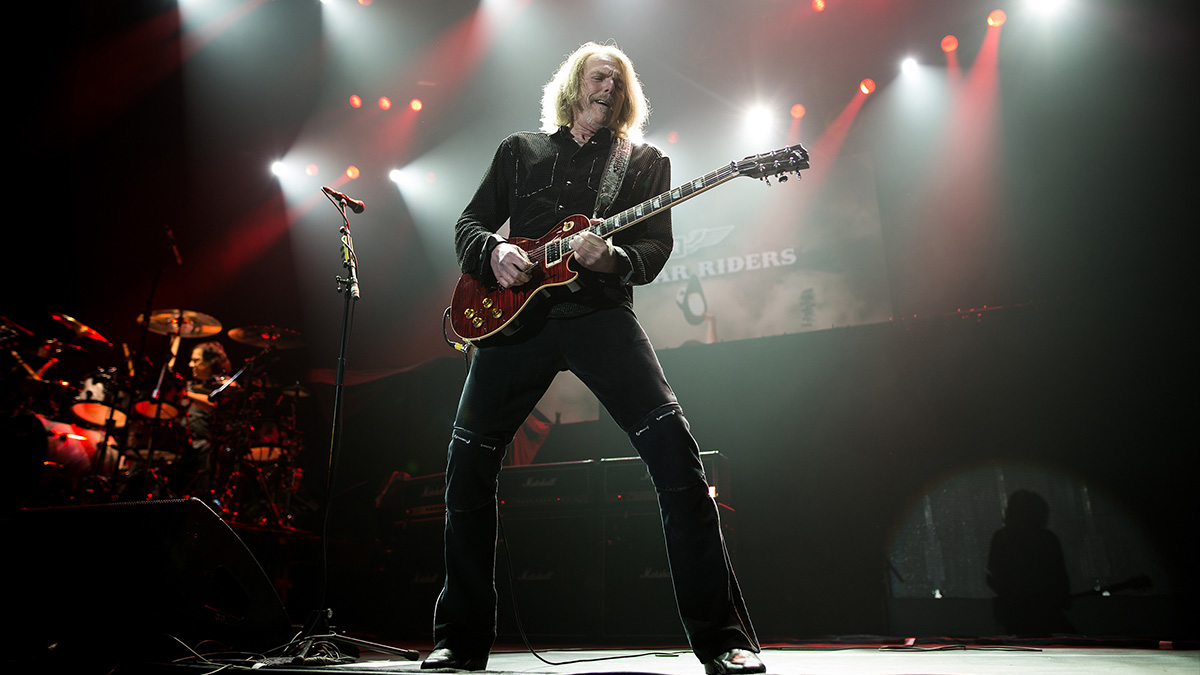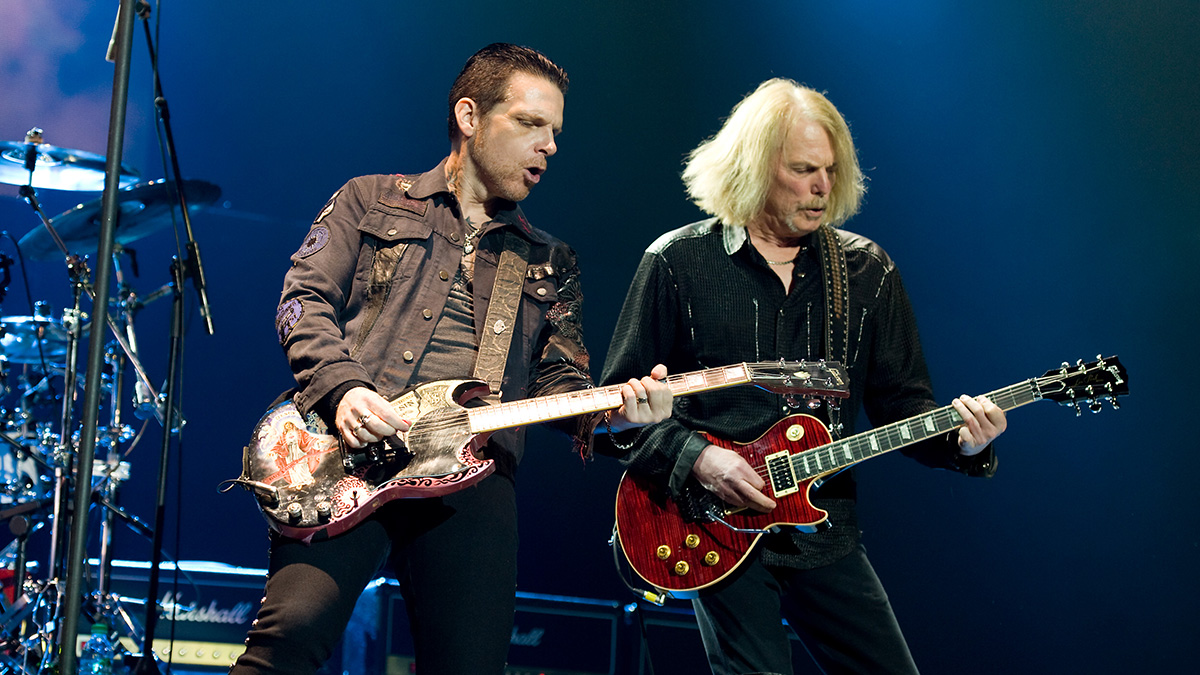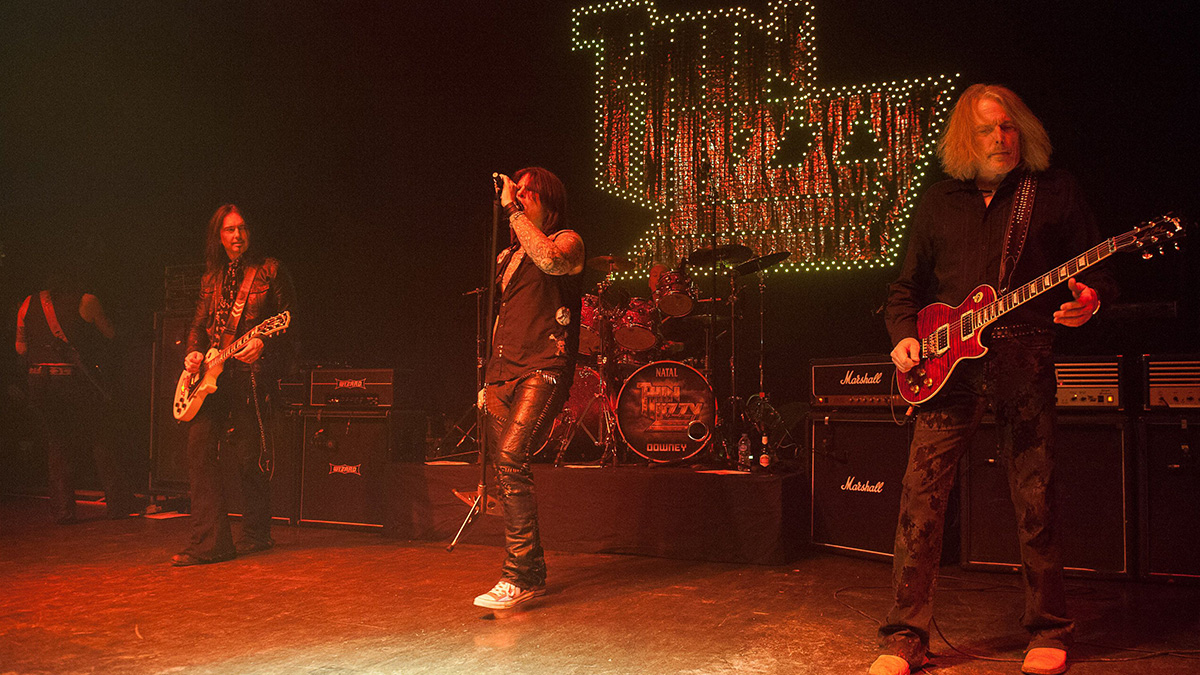Thin Lizzy's Scott Gorham: my top 5 tips for guitarists
Plus, guitar ace talks Thin Lizzy Anniversary shows and new Black Star Riders album

Introduction: Anniversary and beyond
This year sees two important anniversaries on the Thin Lizzy calendar. Not only does 2016 mark 40 years since the seminal Jailbreak album, but it's also 30 years since the death of the band’s leader, Phil Lynott.
Guitarist Scott Gorham, who first joined the band in 1974 and has been flying their flag in various guises on and off ever since, is putting Lizzy back on the road for a handful of shows to mark the occasions.
“We haven’t really played a Thin Lizzy set in over four years,” the Black Star Riders man says. “It started in early 2014: people kept asking me what I would be doing to mark the 30th year of Phil’s death.
I don’t think I’ll be alive for the 40th anniversary of Phil's death, so this will be it
“I hadn’t thought of it until that point, but the question kept coming up. This isn’t Thin Lizzy getting back together again: these are anniversary shows. I don’t think I’ll be alive for the 40th anniversary, so this will be it.”
Gorham has recruited some familiar faces to help fill in the blanks in the band’s line-up. Judas Priest man Scott Travis will be behind the kit, while Aerosmith’s Tom Hamilton will be on bass.
“These guys are huge Thin Lizzy fans, and that’s the only way you will get up on this stage with us. These guys are great players. Scott is an incredible drummer. Tom is a great player with a great feel as well. That’s the kind of musicianship that these songs demand.”
These guys are huge Thin Lizzy fans, and that’s the only way you will get up on this stage with us
The first show show of the tour is in Germany on 17 June, and Gorham reveals that he’s already hard at work.
“We sat down and worked out a setlist and everybody is doing what we call shedding - that’s sitting at home getting as familiar with the songs as possible until we get together in London for a week of rehearsals.
“People are always suggesting songs that we don’t often play live, or even songs we’ve never played. We have to take that into consideration, but the last thing you want to see when you play a song is a bunch of blank faces. We’ll pull a couple of songs out that people haven’t heard us do.”
And that’s not all that Gorham has going on; there’s also the little matter of a brand-new Black Star Riders album which is due in 2017.
A lot of bands don’t get past one album, and here we are on our third. I’m so pleased; it’s unbelievable
“Ricky [Warwick] and Damon [Johnson] are going to stay with me for a few days and we will sit down in my back room and work on some parts and riffs. Ricky already has an album-and-a-half’s worth of lyrics - the guy is a god-damn machine! A lot of bands don’t get past one album, and here we are on our third. I’m so pleased; it’s unbelievable.”
Never mind one album, Gorham has dozens of classic records to his name and north of 40 years of experience on the road. So, when he offers up his top five tips for guitarists, you’d better listen...
Thin Lizzy play the following Anniversary shows this summer:
17 June - Germany, Loreley - Freilichtbuhne (w/ Rainbow)
18 June - Germany, Bietigheim-Bissingen - Festplatz Am Viadukt (w/ Rainbow)
17 July - Spain, Barcelona - Rock Fest
23 July - UK, Maidstone Kent - Ramblin’ Man Fair Festival
6 August - Sweden, Rejmeyre - Skogsrojet Festival
Don't Miss

1. Be a talent-spotter
“Being able to spot the right people for your band is everything. If you don’t have the right people then you don’t pass go - you just throw yourself into a terrible situation. If you do that, then you let the audience down.
“You have to think long and hard about who wants to be in your band, and then who can be in your band. With Thin Lizzy, my head is on the chopping block if I don’t get the right members in.
“Thankfully, so far, I have picked the right people for the right jobs, and long may that continue. It’s not like I pick guys out of thin air or just watch them on YouTube. I have been up close and personal with the guys in the band before they joined, so that way I have 100 per cent confidence that it will work and that it will work in a big way.
“I remember when I first hired Ricky to front Thin Lizzy, everybody thought I was fucking crazy. They said, ‘What?! The guy from the Almighty?!’ I had worked with him before, and knew people needed to give him a chance. After we did the first tour, everybody got it. I feel pretty vindicated in that respect, in that I can say, 'I told you so!'”

2. Don't get red-light fever
“You need to relax when you go into the studio. It is too easy to get red-light fever when you go into record. What I mean by that is that you run through the song and it goes perfectly, and then as soon as you see the red record light go on: bang, you just freeze up and think, ‘Oh my god, it is recording!’
“You just need to relax. You can have more than one go at it, so you might as well just enjoy it. Plus, if you are well-rehearsed and you know your guitar parts going into the studio and what you want to do, then you will be able to relax and have fun.
“You need to remember that not everybody gets to record an album, so you have to make sure you’re having fun. You must have a blast while you’re recording, and just try to be as creative as you possibly can.
When you go out live, that is your chance to improve on what you did in the studio
“People often ask why you don’t play recorded solos note-for-note live. You have to remind them that when you’re in the studio recording guitar parts and solos, that is on the day. Some of it might be worked out, but some of it is just pure improv.
“A lot of the time you will walk away from the studio recording a solo, and you’ll think you wish you had spent five more minutes on it. When you go out live, that is your chance to improve on what you did in the studio. I have to point that out to fans a lot of the time. Not everything is etched in stone when you're playing tracks live.”

3. Get into your gear
“Being able to hone in on your own personal equipment is a must. Some guys do not pick the right equipment, and don’t delve too deep into what their actual defining sound is.
“I’ve had a lot of practice with that, because I’ve been around for some damn long, so that becomes a little bit easier for me. But I would say that you should not be afraid to try out different pieces of equipment, even things like pedals.
“Years ago, I used to get people asking me how I got the sound that I had on the Fighting album or the Jailbreak album. I would say, ‘That fucking sound was all that we had!’ Guitar players used to be so limited in what we could choose that it became frustrating.
“Thankfully, the pedal manufacturers and your amplifier manufacturers recognised this and honed in on it so that now you have a whole array of pedals and amps for every sound you might want, so you should try them!”

4. Get in your back room
“Practise is always a good tip. I get so many people saying that I have been in this business so long that I probably don’t have to practise anymore. I give them a look and say, ‘What, are you fucking kidding me?’ Even concert pianists have to practise.
“A lot of people don’t understand that it’s not just knowing the notes; it is all down to the timing and making sure you’re all limbered up and ready to go. Your own personal rehearsal is a huge responsibility. If you’re really serious about it then rehearsal doesn’t become a hard thing to do; it becomes something you want to do. Even guys like me rehearse in our back rooms.”

5. Chase that perfect song
“The inspiration for me comes from that I don’t think I have written or played on the perfect song. Obviously that is never going to happen, because there’s no such thing.
“I think that you need to use that, though, to drive you on to make the song you’re working on better than the last. You want the production to improve; you always want your next album to be your best. That will help you keep going.
“You will never master this thing, and that’s one of the cool things about music. It’s a cliché, but you are always learning and you can always get more out of yourself and out of your bandmates.”
Don't Miss
Rich is a teacher, one time Rhythm staff writer and experienced freelance journalist who has interviewed countless revered musicians, engineers, producers and stars for the our world-leading music making portfolio, including such titles as Rhythm, Total Guitar, Guitarist, Guitar World, and MusicRadar. His victims include such luminaries as Ice T, Mark Guilani and Jamie Oliver (the drumming one).
